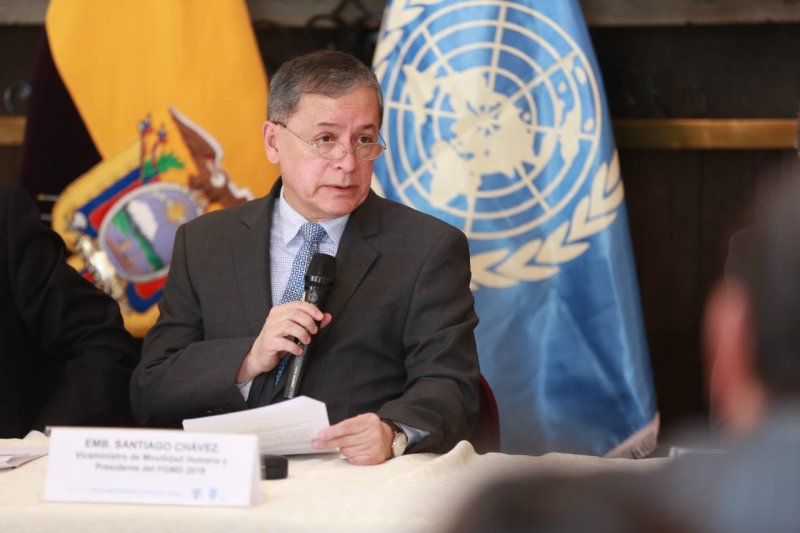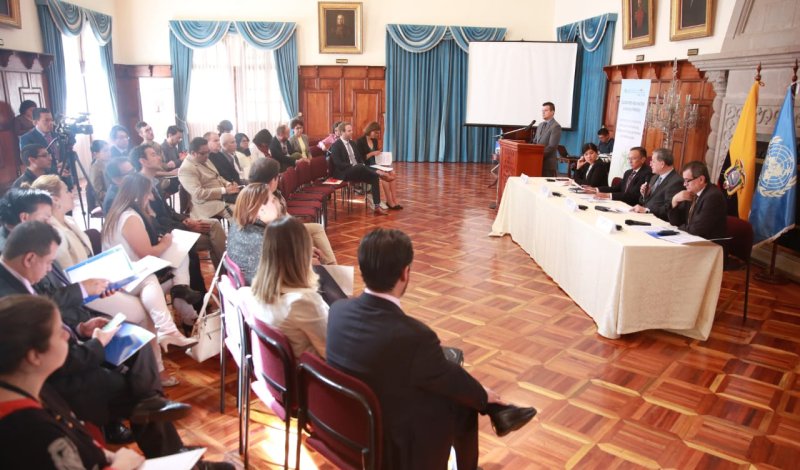Second GFMD Civil Society Workshop in Quito, Ecuador - June 19th 2019

On June 19th, as part of the Global Forum on Migration and Development (GFMD) national process, Ecuador´s chairmanship organized a workshop with representatives from civil society, including more than 20 different organizations in the country. The objective of this activity was to communicate how the civil society mechanism works and emphasize the importance of ensuring the participation of national organizations in the process. Also, this dialogue served the purpose of exchanging perspectives on the substantive priorities established by the Ecuadorian GFMD Chairmanship.
The workshop was divided in three sections. During the first section, Ambassador Santiago Javier Chávez Pareja, Vice Minister for Human Mobility of Ecuador and GFMD 2019 Chair outlined the process towards the GFMD Summit, emphasizing the importance of civil society that should take an active part in the discussion. In his welcome remarks, Jose Ivan Dávalos, Chief of Mission of the IOM in Ecuador, stressed the liaison between IOM and the GFMD, including the technical and substantive support given as Coordinator and Secretariat of the UN Migration Network. Representing the GFMD Support Unit, Ms. Estrella Lajom informed on the structure of the civil society mechanism and its inclusive space for dialogue that includes the “Common Space” and the “Civil Society Days.”
Mr. Andrés Montalvo, Head of the GFMD Taskforce, emphasized that representatives of civil society, both in Ecuador and beyond, must work on a common position to reach a sustainable process before and after the Quito Summit.
The second section included a presentation by civil society representatives. Firstly, Ms. Clara Skupien of the International Catholic Migration Commission (ICMC), focal point of the civil society mechanism, introduced the framework of the GFMD that includes the Steering Group and ICMC as an intermediate actor to implement decisions. In this context, she emphasized the need for national organizations to self-organize and support the process. Secondly, Ms. Berenice Valdez from the Mexican Instituto para las Mujeres en la Migración (IMUMI) stressed the importance of having a Latin-American leadership and the need to incorporate discussions from the global south in the Summit. Thirdly, Ms. Leda dos Reis, representative of Red Clamor (network of faith-based migration NGOs) sketched the network´s work on a regional level and mentioned that the discussion of civil society should be based on strengthening responses in view of the migratory situation in the region, while putting particular emphasis on guaranteeing rights and services to migrants. Director of Centro de Documentación de Derechos Humanos (SMI), Mr. Pablo de la Vega, highlighted the importance of having civil society included in the GFMD process, to ensure accountability, forge alliances and develop a human-rights based approach.


The third section provided a space for the participation of other civil society representatives through an open dialogue. Inter alia, topics included the specific needs of LGBT migrants and a particular emphasis on the situation of migrants from Latin America living abroad in the European and North American continents. Finally, the participants agreed to work on a coherent articulation with a view to a meaningful participation in the GFMD process.
Overall, there was a consensus among the participants to maintain future exchanges in order to foster meaningful cooperation among all relevant stakeholders in the GFMD process and towards the Quito Summit.
